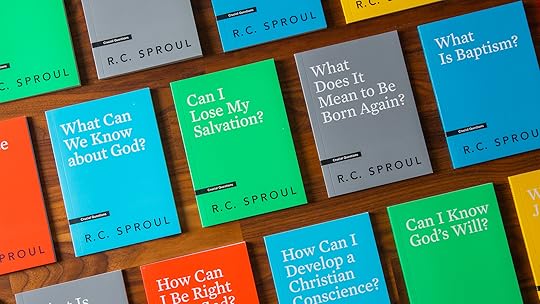R.C. Sproul's Blog, page 111
November 12, 2019
True Gratefulness
Here’s an excerpt from True Gratefulness, David Murray's contribution to the November issue of Tabletalk:
It's been a tough year or so. A friend suffered a serious sexual assault. My wife’s ninety-year-old father is in hospice care, slowly dying from cancer on the other side of the Atlantic. A few months ago, I thought I had killed my eighty-year-old father when I accidentally ran over his leg with my car in my driveway. Three men in my wider circles committed suicide. And there have been an unusually large number of lesser stresses and disappointments.
Then, Tabletalk asked me to write on “giv[ing] thanks in all circumstances” (1 Thess. 5:18). The Lord knew I needed this admonition, and I’m now forced to figure out what it actually means and how to do it.
TRUE GRATEFULNESS
So, if it’s not giving thanks for all circumstances, if it’s not giving thanks by ignoring circumstances, and if it’s not giving thanks despite circumstances, what does 1 Thessalonians 5:18 mean? The key is the smallest word in the verse. Whatever circumstances we are in, we are to find cause for thanksgiving. This still allows us to lament sin and suffering, but it also requires us to find reasons for thanking God at the same time, or at least eventually. Let me give you some examples of how I’ve tried to build truth-based thankfulness in the midst of hard times.
While lamenting my friend’s traumatic assault with her, I thank God for the strength He has given her to pursue justice while also using her experience to help other sufferers. I thank God for the people and organizations God has blessed with expertise to help such victims recover.
Continue reading True Gratefulness, or begin receiving Tabletalk magazine by signing up for a free 3-month trial.
For a limited time, the new TabletalkMagazine.com allows everyone to browse and read the growing library of back issues, including this month’s issue.


November 11, 2019
Kingsburg Conference in CA: Early-Bird Rate Ends on November 18

Now is the time to secure your spot for our 2020 Kingsburg Conference in California. The early-bird discount ends on November 18, so don’t delay. Register today and save.
Join us on April 24-25, 2020, for Unashamed, a two-day conference in Kingsburg, CA. W. Robert Godfrey, Steven Lawson, and John MacArthur will remind us of the power of the good news, paint a picture of gospel-shaped ministry, and help us to say along with the Apostle Paul, “I am not ashamed of the gospel” (Rom. 1:16). Register today and save.
Sessions
The Gospel of God Regarding His Son by Steven Lawson
The Mark of Faith by W. Robert Godfrey
Encouraged by Faith by John MacArthur
Q&A with Godfrey, Lawson, and MacArthur
Gospel Obligation by Steven Lawson
The Power of God by W. Robert Godfrey
Faith from First to Last by John MacArthur
Register Now


Why Did God Rest After the Six Days of Creation?

The ultimate purpose of creation is holiness. From one of our Ask R.C. events, R.C. Sproul encourages us to keep the right focus when we think about the world and our place in it.
To get real-time answers to your biblical and theological questions, just Ask.Ligonier.org.
Read the Transcript


Catechetical Evangelism

Although evangelism differs to some degree from generation to generation according to gifts, culture, style, and language, the primary methods of Puritan evangelism—plain preaching and catechetical teaching—can show us much about how to present the gospel to sinners.
Like the Reformers, the Puritans were catechists. They believed that pulpit messages should be reinforced by personalized ministry through catechesis—the instruction in the doctrines of Scripture using catechisms. Puritan catechizing was evangelistic in several ways.
Scores of Puritans reached out evangelistically to children and young people by writing catechism books that explained fundamental Christian doctrines via questions and answers supported by Scripture. For example, John Cotton titled his catechism Milk for Babes, drawn out of the Breasts of both Testaments. Other Puritans included in the titles of their catechisms such expressions as "the main and fundamental points," "the sum of the Christian religion," the "several heads" or "first principles" of religion, and "the ABC of Christianity." At various levels in the church as well as in the homes of their parishioners, Puritan ministers taught rising generations from both the Bible and their catechisms. Their goals were to explain the fundamental teachings of the Bible, to help young people commit the Bible to memory, to make sermons and the sacraments more understandable, to prepare covenant children for confession of faith, to teach them how to defend their faith against error, and to help parents teach their own children.
Catechizing was a follow-up to sermons and a way to reach neighbors with the gospel. Alleine reportedly followed his work on Sunday by several days each week of catechizing church members as well as reaching out with the gospel to people he met on the streets. Baxter, whose vision for catechizing is expounded in The Reformed Pastor, said that he came to the painful conclusion that "some ignorant persons, who have been so long unprofitable hearers, have got more knowledge and remorse of conscience in half an hour's close disclosure, than they did from ten years' public preaching." Baxter invited people to his home every Thursday evening to discuss and pray for blessing on the sermons of the previous Sabbath.
The hard work of the Puritan catechist was greatly rewarded. Richard Greenham claimed that catechism teaching built up the Reformed church and seriously damaged Roman Catholicism. When Baxter was installed at Kidderminster in Worcestershire, perhaps one family in each street honored God in family worship; at the end of his ministry there, there were streets where every family did so. He could say that of the six hundred converts brought to faith under his preaching, he could not name one who had backslidden to the ways of the world. How vastly different was that result compared with those of today's evangelists, who press for mass conversions and turn over the hard work of follow-up to others.
This excerpt is adapted from Living for God's Glory: An Introduction to Calvinism by Joel Beeke.


November 9, 2019
The Passion of Martin Luther

In this brief clip from his teaching series A Survey of Church History, W. Robert Godfrey examines Martin Luther's passion that Christ be central in all things. Watch this entire message for free.
Transcript
For Luther then, the great theological point was the centrality of Christ, was the presence of Christ amongst His people to save His people from their sins. He wanted a people who knew the Bible – Sola Scriptura “the Bible alone”. He wanted a people that rested in Christ's finished work – Christ alone. He wanted a people who trusted that Christ and found that in the trust they had for Christ was their salvation – that‘s faith alone. And he wanted them to recognize that even the gift of faith was from God, not from them – that’s by grace alone. That was the passion of Luther's heart and that's why Luther would say, “I'm not that worried about all these externals” – the exact words of the mass, the exact decoration of a church. Let’s not get hung up on those things because if we get hung up on those things, it’s going to detract from Christ. That passion of Luther is something that you feel on almost every page that you read of Luther.


November 8, 2019
What Would You Say In Response to the Doctrine of Baptismal Regeneration?

We cannot assume that someone has been born again simply because they have been baptized. From one of our Ask R.C. events, R.C. Sproul provides a biblical response to the doctrine of baptismal regeneration.
To get real-time answers to your biblical and theological questions, just Ask.Ligonier.org.
Read the Transcript


Dignity, Faith, & Work

Charles Dickens began A Tale of Two Cities with the immortal lines: “It was the best of times, it was the worst of times.” These words sound like a contradiction, dissonant to the ear, harsh to the brain. How could the times be both best and worst?
Before Charles Dickens ever picked up a pen, the French mathematician, philosopher, and writer Blaise Pascal had made use of the paradox. For Pascal, man himself is the crowning paradox of all creation. He said that we are at the same time the creatures of highest grandeur and lowest misery. The paradox is that we can think, an ability which is a two-edged sword. That we can contemplate ourselves is our grandeur. The misery comes when we contemplate a better life than we now enjoy and realize we are unable to make it happen. We have just enough knowledge to escape the bliss of ignorance. Translated into daily realities, this means that a person with enormous wealth can conceive of yet more wealth, power, prestige, health, fame—all things can be increased or improved. But consider that person who commands such a vast amount of money, yet who suffers from ill health or grieves over the death of a loved one. Ultimately, human dignity is built on the conviction that someone is up there who made us. Behind human dignity is theology.
I was addressing the top executives of a Fortune 500 corporation. It was a small group composed of regional vice presidents and the president and chairman of the board. The surroundings exuded an ambiance of power and prestige. The patrician audience was a bit nervous about my mixing “religion” and business as I spoke. When the seminar was near completion, the chairman of the board became excited as his eyes lit up in understanding. “Let me see if I can connect what you’re saying. What I hear is that our business life is affected by how we treat people. How we treat people is a matter of ethics. Ethics are determined by our philosophy. Our philosophy reflects our theology—so respecting people is really a theological matter.” In simple terms, the chairman was expressing what Dostoevsky meant when he said, “If there is no God, all things are permissible,” or Sartre was driving at when he said, “Man is a useless passion.”
These are statements about human dignity, and they touch the auto worker, the coal miner, the newspaper reporter, and the insurance salesman. If nobody is at home in heaven, then the labor of the corporate executive and the labor of the janitor are equally useless. Some seek to sidestep the dilemma by skirting the issue with the artful dodge of compromise. The humanist rejects God while affirming loudly the value of people. He joins hands with Christians and Jews to march for human rights, to eliminate slavery, to halt the oppression of the poor, to build hospitals that care for men and women in misery. He exalts the virtues of honesty, justice, and compassion, but he must crucify his mind to do it. For the humanist is caught in the vicious contradiction of ascribing dignity to creatures who live their lives between the poles of meaninglessness. He lives on borrowed capital, deriving his values from the Judeo-Christian faith, while at the same time repudiating the very foundation upon which these values rest. He is still looking for someone else up there to help him, but no answer comes. His assigning of value to man is utterly gratuitous, based not on reason but on preference and preference alone.
We must ask the humanist some harsh and difficult questions: Why should we care at all about the plight of insignificant grown-up germs? What difference does it make if the white germs subjugate the black germs and make them sit at the back of the bus? Who cares if meaningless blobs of protoplasm are exploited in a steel mill or robbed in the halls of justice?
Oh, you say, the black germs care and the little blobs of protoplasm cry out. Again, I say, “So what?” A creature with no ultimate value, one who is ultimately insignificant, is not worth any sacrifice. Tell it to the idiot, as he alone can live with empty sound and fury. If man is valueless, then we can all sleep in tomorrow morning.
Apart from hard-boiled skeptics, few of us respond to humanism in such fashion. We follow sentimentality and accept the humanist’s happy inconsistency. We too are human and we are often content to let the humanist retain the cake he has already eaten. We applaud his magic feat of having a world come from nothing, like the rabbit out of the hat. We stare in wonder at his ability to get being from nothingness, dignity from insignificance, personality from impersonality; and we marvel at the humanist’s ability to stand firmly with both feet planted in midair.
This excerpt is adapted from The Hunger for Significance, P&R Publishing, Phillipsburg, NJ.


November 7, 2019
$5 Friday: Justification, Prayer, & Salvation

It’s time for our weekly $5 Friday sale. This week’s resources include such topics as justification, salvation, faith, prayer, repentance, Roman Catholicism, and more.
Sale runs through 12:01 a.m. — 11:59 p.m. Friday ET.
View today’s $5 Friday sale items.


Gratefulness and Entitlement
Here’s an excerpt from Gratefulness and Entitlement, Burk Parsons' contribution to the November issue of Tabletalk:
As a local church pastor, I have the privilege of serving people of all ages. Some of those whom I have served for nearly two decades have been my friends for nearly as long. While I am close friends with men who are in their thirties and forties, I am also close friends with men in their sixties and seventies. I have often considered why I have so thoroughly enjoyed being friends with older men, including the late Dr. R.C. Sproul (who would have been eighty this year). I have come to realize that much of the reason I have always enjoyed the friendship of men so much older than I am is partly because my father was older than most of the fathers of boys my age. My father was born in 1924, and he was my best friend until he passed away in 1992. My father lived through the Great Depression, had a paper route at the age of seven, fought in World War II, and lost his first son in a tragic accident in 1969. My father learned to live with little, and he told me always to learn to live with a little less. Through much hardship, my father learned to be grateful. And my dear mother, who in many ways has experienced even greater hardships in life than my father did, learned to be grateful. By their examples, I learned gratefulness as a way of life.
Continue reading Gratefulness and Entitlement, or begin receiving Tabletalk magazine by signing up for a free 3-month trial.
For a limited time, the new TabletalkMagazine.com allows everyone to browse and read the growing library of back issues, including this month’s issue.


November 6, 2019
Crucial Questions: 32 Free eBooks from R.C. Sproul

To further help Christians know what they believe, why they believe it, how to live it, and how to share it, in May 2013 we made the ebook editions of R.C. Sproul's Crucial Questions series free forever. We continue to publish new ebooks in this series and this year have added What Is Predestination? and Why Should I Join a Church?
Here is a complete list of the free ebooks in the Crucial Questions series
Are People Basically Good? (Kindle) (iBooks)
Are These the Last Days? (Kindle) (iBooks) (Español Kindle) (Español iBooks)
Can I Be Sure I'm Saved? (Kindle) (iBooks) (Español Kindle) (Español iBooks)
Can I Have Joy in My Life? (Kindle) (iBooks) (Español Kindle) (Español iBooks)
Can I Know God's Will? (Kindle) (iBooks) (Español Kindle) (Español iBooks)
Can I Lose My Salvation? (Kindle) (iBooks) (Español Kindle) (Español iBooks)
Can I Trust the Bible? (Kindle) (iBooks) (Español Kindle) (Español iBooks)
Does God Control Everything? (Kindle) (iBooks) (Español Kindle) (Español iBooks)
Does Prayer Change Things? (Kindle) (iBooks) (Español Kindle) (Español iBooks)
How Can I Be Blessed? (Kindle) (iBooks)
How Can I Develop a Christian Conscience? (Kindle) (iBooks) (Español Kindle) (Español iBooks)
How Can I Be Right with God? (Kindle) (iBooks)
How Should I Live in this World? (Kindle) (iBooks) (Español Kindle)
How Should I Think about Money? (Kindle) (iBooks)
What Can I Do with My Guilt? (Kindle) (iBooks) (Español Kindle) (Español iBooks)
What Can We Know about God? (Kindle) (iBooks)
What Do Jesus’ Parables Mean? (Kindle) (iBooks)
What Does It Mean to be Born Again? (Kindle) (iBooks) (Español Kindle) (Español iBooks)
What Is Baptism? (Kindle) (iBooks) (Español Kindle) (Español iBooks)
What Is Faith? (Kindle) (iBooks) (Español Kindle) (Español iBooks)
What Is the Great Commission? (Kindle) (iBooks) (Español Kindle)
What Is Repentance? (Kindle) (iBooks) (Español Kindle)
What Is the Church? (Kindle) (iBooks) (Español Kindle) (Español iBooks)
What Is the Lord's Supper? (Kindle) (iBooks) (Español Kindle)
What Is the Relationship between Church and State? (Kindle) (iBooks) (Español Kindle) (Español iBooks)
What Is the Trinity? (Kindle) (iBooks) (Español Kinde) (Español iBooks)
Who Is Jesus? (Kindle) (iBooks) (Español Kindle) (Español iBooks)
Who Is the Holy Spirit? (Kindle) (iBooks) (Español Kindle) (Español iBooks)
Does God Exist? (Kindle)
How Does God’s Law Apply to Me? (Kindle)
What Is Predestination? (Kindle) New
Why Should I Join a Church? (Kindle) New
You can also download the free collection from Logos.
Please share these resources with your church, family, and friends. Not sure how to download an eBook? Please see our FAQ section.


R.C. Sproul's Blog
- R.C. Sproul's profile
- 1932 followers



